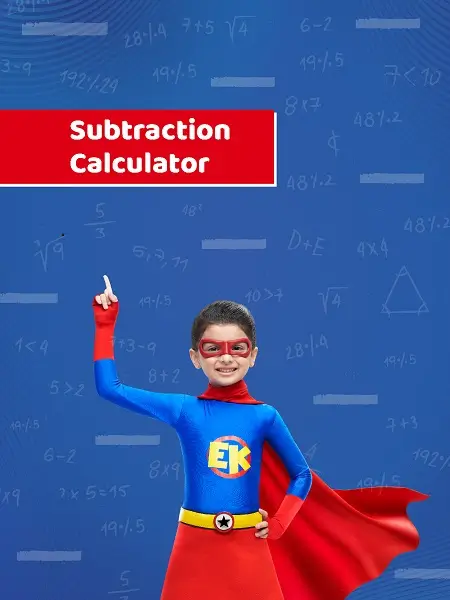Introduction
Learning subtraction is one of the most important early math skills for children. With our subtraction calculator for kids, the process becomes simple, engaging, and interactive. Our online subtraction calculator helps children practise subtraction problems step by step, making math fun and easy to understand.
What is Subtraction?
Subtraction is one of the four basic arithmetic operations. It is the process of taking away one number from another. For example, 10 – 3 = 7. The subtraction calculator online makes this concept clear by showing how numbers decrease when one value is taken away from another. Children can practise sums instantly with our online subtraction calculator.
Steps for Kids to Use the Subtraction Calculator
Using our subtraction calculator is easy with the following steps:
- Step 1: : Enter the first number (minuend).
- Step 2: : Enter the second number (subtrahend).
- Step 3: : Click on “Calculate.”
- Step 4: : Get the result (difference) along with clear steps. Our subtraction calculator for kids ensures that children not only get the correct answer.
Our calculator for multiplication breaks the process into steps so that kids not only get the answer but also learn the method.
Why Learning Subtraction is Important for kids
Subtraction is a building block for many advanced math skills like multiplication, division, and fractions. Practising with the step-by-step subtraction calculator helps kids improve logical thinking, problem-solving, and number sense. A strong foundation in subtraction also prepares children for more advanced math concepts.
Everyday Uses of Subtraction for Kids
Subtraction is used in daily life more often than kids realise. For example:
- 1. Finding out how much money is left after buying a toy.
- 2. Calculating how many chocolates remain after sharing with friends.
- 3. Understanding time differences, like how many minutes are left until bedtime.
Ultimately, our online subtraction calculator helps children connect real-life examples to classroom learning, making math more practical and useful.
Making Learning Fun with Our Subtraction Calculator
The best way to learn subtraction is through play. The subtraction calculator with steps makes learning enjoyable by breaking down each calculation clearly. Teachers and parents can also use games, puzzles, and interactive activities alongside the subtraction calculator for kids to make subtraction engaging and fun.
Frequently Asked Questions (FAQs)
Q1. How do you calculate subtraction?
To calculate subtraction, subtract the second number (subtrahend) from the first number (minuend). For example, 8 – 3 = 5. With the subtraction calculator online, children can enter numbers and instantly see the result.
Q2. At what age should kids start learning subtraction?
Most children begin learning basic subtraction around the ages of 5 to 6, when they are comfortable with addition. Using tools like a subtraction calculator for kids can make early learning fun and stress-free, ensuring they understand subtraction before moving on to more advanced topics.
Q3. What other math tools can help children learn better alongside the Subtraction Calculator?
Along with the subtraction calculator online, children can use the addition calculator, multiplication calculator, and division calculator. These tools, when used together with the subtraction calculator with steps, help children strengthen their math foundation in an engaging and interactive way.

